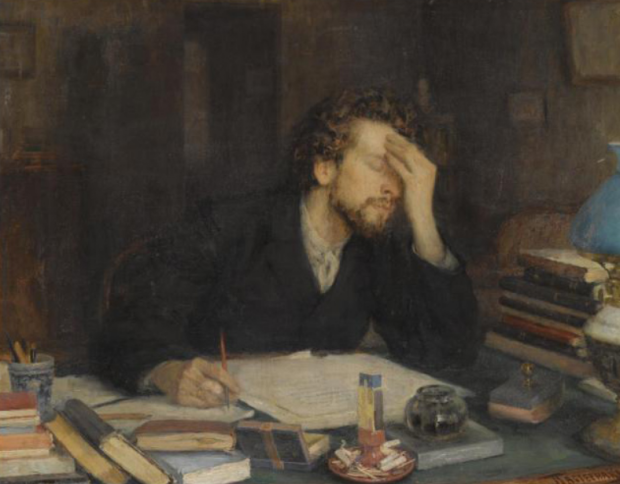
First Communion by Pablo Picasso
Part of my Christmas charity involved going with my parents to their parish. I don’t presently have a fixed parish of my, since I’m living with them and my life is very unsettled, but I generally go to one of two other churches, one of which is run by the priests of Miles Christi and is very traditional (Sunday mass isn’t in the Tridentine rite, but they do celebrate the Consecration in Latin and ad orientum), the other is more or less a typical novus ordo, though reliably orthodox. My parents’ church I avoid because the pastor, though a very nice man and, I believe, very orthodox gives the worst, most insipid homilies I have ever heard in a Catholic Church. I don’t think they’re in any way heretical, but they’re too banal for that to even be a possibility: they don’t contain enough instruction for the question of heresy to even arise.
Put it this way: his Christmas homily was based on a story in The New York Times that sounded like the treatment for a particularly bad Hallmark channel original movie. I was left thinking that the My Little Pony holiday special I’d just watched was more relevant and theologically rich than this.
I suppose in someways I’m a bit of a snob, especially when it comes to religion. I’m someone who gets annoyed by sloppiness in the liturgy, or smaltziness in homilies. Even when the homilies are better than the ones my parents’ priest gives, I still often find myself thinking that they miss important details, or they focus too much on the congregation, or are too vague. I’m also very critical of Church decor, if it seems drab or ugly I sit thinking about how they could and should do better.
But it’s not just about religious matters: I’m a snob about art and philosophy as well. Well-meaning nonsense irritates me, and attempts by narrow minds to appear broad, or sloppy thinking makes me roll my eyes. In art I frankly give no slack for the ‘bold’ or ‘innovative’ if what it produces is ugly or degrading – I loathe Picasso’s more famous works, for instance and think Duchomp was a charlatan.
Yet, at the same time, many of my favorite works are the frankly popular and low-brow: Disney movies, children’s cartoons, monster movies, fantasy and adventure novels, and so on. I can be extremely critical of a homily that plays too much to the crowd, but I can love a film that does the same.
Is there a disconnect here? I don’t think so. You see, the question is what you’re trying to do, who you’re doing it for, and (most important) whether you’re giving your all. I hate most of Picasso’s work in part because he was a very talented artist: if you look up some of his early work it’s quite beautiful (see the picture that heads this post for instance). But instead he chose, whether for commercial or ideological reasons, to paint hideous crap
On the other hand, I really like the film Freddy vs. Jason because, while it’s not really a ‘good’ movie, it is a movie that tried very hard to be as good as it could possibly be. It knows what it is and simply tries to excel at that. Moreover, Freddy vs. Jason is a pulpy horror film: it seeks to create some very basic emotions and some very cheap thrills. That’s a low bar, and the film clears it handily while also giving us more than we expected. It is eminently suited to the end for which it was created.
That’s why I’m so harsh in some things and not in others: it’s a question of how much effort is put towards what end. When the end is giving people a few hours of entertainment, or telling stories to children, and the makers put as much effort as they can into it, I’ll sing their praises. When the end is showcasing beauty and truth, and the makers try to pull cheap gimmicks or make only a token effort, I’ll come down on them. When the end is conveying the Word of God and the result is a cutesy story to elicit some warm fuzzies, then I turn my back on it. Not because I have anything against warm fuzzies or even cutesy stories, but because God – and the people come to hear about Him – deserve more.
My point in all this is that I think God’s way of judging us is much the same, as indicated by the parable of the Talents, as well as the story of Cain and Abel. It’s not the work itself that primarily interests Him: He has just as much use for a mason as for a Mozart, which is to say none. All that we have and are come from Him, and we can’t offer Him anything that wasn’t His to begin with. The question isn’t the work itself, but to what end we do it and how hard we try at it.
Nobility, I think, means living as well as we possibly can, which means the more of virtue and beauty and truth that we know of, the more we are obliged to practice them in our lives. In short, whatever else we are obliged to do, we are at least obliged to do it as well as we possibly can. It is that will to do good, to offer the best we have, that really counts.




 It’s said that one of the best ways to learn something is to teach it. If nothing else, you may do some good for others.
It’s said that one of the best ways to learn something is to teach it. If nothing else, you may do some good for others.